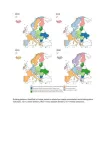(Press-News.org) The risk of developing Parkinson’s is at least twice as high in people with anxiety compared to those without, finds a new study by UCL researchers.
The research, published in the British Journal of General Practice, investigated whether there was a link between people over the age of 50 who had recently developed anxiety and a later diagnosis of Parkinson’s.
The team used UK primary care data between 2008 and 2018 and assessed 109,435 patients who had developed anxiety after the age of 50 and compared them to 878,256 matched controls who did not have anxiety.
They then tracked the presence of Parkinson’s features - such as sleep problems, depression, tremor and balance impairment - from the point of their anxiety diagnosis up until one year before the date of a Parkinson’s diagnosis, to help them understand each group’s risk of developing Parkinson’s over time and what their risk factors might be.
The team made sure to adjust the results to account for age, sex, social deprivation, lifestyle factors, severe mental illness, head trauma and dementia – which may affect the likelihood of developing the condition in people with anxiety.
Consequently, they found that the risk of developing Parkinson’s increased two-fold in people with anxiety, compared to the control group.
They also confirmed that symptoms such as depression, sleep disturbance, fatigue, cognitive impairment, hypotension, tremor, rigidity, balance impairment, and constipation, were risk factors for developing Parkinson’s in people with anxiety.
Co-lead author, Dr Juan Bazo Avarez (UCL Epidemiology & Health), said: “Parkinson’s disease is the second most common neurodegenerative condition worldwide, and it is estimated that it will affect 14.2 million people by 2040.
“Anxiety is known to be a feature of the early stages of Parkinson’s disease, but prior to our study, the prospective risk of Parkinson’s in those over the age of 50 with new-onset anxiety was unknown.
“By understanding that anxiety and the mentioned features are linked to a higher risk of developing Parkinson’s disease over the age of 50, we hope that we may be able to detect the condition earlier and help patients get the treatment they need.”
Parkinson’s disease is the world’s fastest growing neurodegenerative disorder and currently affects nearly 10 million people across the globe.
The condition is a progressive disorder that is caused by the death of nerve cells in the part of the brain called the substantia nigra, which controls movement. These nerve cells die or become impaired, losing the ability to produce an important chemical called dopamine, due to the build-up of a protein called alpha-synuclein.
A team of researchers, led by scientists at UCL and University Medical Centre Goettingen, Germany, have recently developed a simple blood test that uses artificial intelligence to predict Parkinson’s up to seven years before the onset of symptoms*.
Co-lead author Professor Anette Schrag (UCL Queen Square Institute of Neurology) said: “Anxiety is not as well researched as other early indicators of Parkinson’s disease. Further research should explore how the early occurrence of anxiety relates to other early symptoms and to the underlying progression of Parkinson’s in its early stages.
“This may lead to better treatment of the condition in its earliest stages.”
The researchers advise that future research should explore why people aged over 50 with new-onset anxiety are more at risk of Parkinson’s and whether their outcomes are affected by the severity of anxiety.
This study was funded by the European Union AND-PD grant.
* https://www.ucl.ac.uk/news/2024/jun/blood-test-could-predict-parkinsons-seven-years-symptoms
END
Risk of Parkinson’s more than double for people with anxiety
Peer reviewed | Observational study | People
2024-06-25
ELSE PRESS RELEASES FROM THIS DATE:
European countries differ in their drinking styles – what is yours?
2024-06-25
A new study of drinking patterns across Europe from 2000 to 2019 shows that drinking occurs in stable, beverage-specific clusters that seem to be partly determined by geography. The study was published today by the scientific journal Addiction.
The study identified six drinking patterns in Europe in 2019:
Wine-drinking countries: France, Greece, Italy, Portugal, and Sweden. Characterized by the highest consumption of wine, lowest consumption of beer and spirits, and lowest overall alcohol consumption.
High beer/low spirit drinking ...
Children born underweight are at increased risk of disease if they develop obesity
2024-06-25
Scientists at the University of Copenhagen discover a link between birthweight and the risk of health complications from obesity during childhood. The findings highlight the need for prevention and treatment approaches for children with obesity who were born with a lower birth weight.
Hundreds of millions of people live with obesity, which is normally measured as a higher-than-optimal body mass index (BMI). While an elevated BMI increases the risk of a range of cardiometabolic diseases and is responsible for around five million deaths a year according to the World Health Organization, not everyone is equally at risk.
Scientists at the ...
New research questions safety of cannabidiol for pregnant women
2024-06-25
Vienna, Austria: Cannabidiol (CBD), one of the active ingredients in cannabis, is thought to be safe as it does not cause a “high”. Increasing numbers of pregnant women take CBD, believing that it can help alleviate symptoms such as morning sickness, insomnia, anxiety and pain.
However, research presented today (Tuesday) at the Federation of European Neuroscience Societies (FENS) Forum 2024 [1,2], suggests that it may affect offspring. Two studies in mice have shown that gestational exposure to CBD alters the behaviour of offspring and also affects the nerve cells (neurons) in the insular cortex (IC) ...
Scientists can now detect antibiotics in your fingerprints – aiding the fight against drug-resistant TB
2024-06-25
A fingerprint may soon be all a doctor needs to check whether tuberculosis patients are taking their antibiotics – thanks to a new study led by the University of Surrey.
Scientists successfully detected the drugs in finger sweat – and with almost the same accuracy as a blood test.
Professor Melanie Bailey, an analytical chemist and co-author of the study from the University of Surrey, said:
“Up until now, blood tests have been the gold standard for detecting drugs in somebody’s ...
Heart disease model puts cells to work
2024-06-25
By Leah Shaffer
Using animals to study heart disease doesn’t always translate well to human health outcomes, and human heart cells available for research don’t work outside the human body.
“You can’t keep them alive, much less function outside of the person for long enough to study these processes,” said Nathaniel Huebsch, an assistant professor of biomedical engineering in the McKelvey School of Engineering at Washington University in St. Louis. Huebsch is studying cells with a mutation that causes hypertrophic cardiomyopathy (HCM), a disease that can set off heart failure ...
Positive emotion skills combat burnout among health care workers
2024-06-24
Intervention improved well-being in workers who were highly stressed by the job
Health care worker burnout was on the rise before COVID-19 and continues today
Addressing significant structural barriers in U.S. health care ‘needs to be a top priority’
Easily accessible individualized solutions also are needed to boost well-being in stressed health-care workers
CHICAGO --- The COVID-19 pandemic exacerbated already rising rates of burnout among American health care workers. A new Northwestern University study found learning and practicing skills that increase positive emotion like gratitude, mindful awareness and self-compassion ...
Partridge receives Department of Energy Vehicle Technologies Office Lifetime Distinguished Achievement Award
2024-06-24
Bill Partridge, a recently retired distinguished researcher at the U.S. Department of Energy’s Oak Ridge National Laboratory, was recognized by DOE’s Vehicle Technologies Office, or VTO, for leading world-class research in transportation throughout his 25-year career. His expertise has guided the development of advanced diagnostic tools that enabled next-generation engines and emissions control systems.
Partridge was presented the Lifetime Distinguished Achievement Award during the VTO Annual Merit Review held on June 3, 2024, in Washington, D.C. He was nominated for the award by the VTO Decarbonization of Offroad, Rail, Marine ...
ACP offers recommendations to support LGBTQ+ health care equity
2024-06-24
Embargoed for release until 5:00 p.m. ET on Monday 24 June 2024
Annals of Internal Medicine Tip Sheet
@Annalsofim
Below please find summaries of new articles that will be published in the next issue of Annals of Internal Medicine. The summaries are not intended to substitute for the full articles as a source of information. This information is under strict embargo and by taking it into possession, media representatives are committing to the terms of the embargo not only on their own behalf, but also on behalf of the organization they represent.
----------------------------
1. ...
Survey shows aspirin use remains high among older adults, despite risks
2024-06-24
Embargoed for release until 5:00 p.m. ET on Monday 24 June 2024
Annals of Internal Medicine Tip Sheet
@Annalsofim
Below please find summaries of new articles that will be published in the next issue of Annals of Internal Medicine. The summaries are not intended to substitute for the full articles as a source of information. This information is under strict embargo and by taking it into possession, media representatives are committing to the terms of the embargo not only on their own behalf, but also ...
New research shows why you don’t need to be perfect to get the job done
2024-06-24
When neuroscientists think about the strategy an animal might use to carry out a task – like finding food, hunting prey, or navigating a maze – they often propose a single model that lays out the best way for the animal to accomplish the job.
But in the real world, animals – and humans – may not use the optimal way, which can be resource intensive. Instead, they use a strategy that’s good enough to do the job but takes a lot less brain power.
In new research, Janelia scientists set out to better ...
LAST 30 PRESS RELEASES:
Under the Lens: Microbiologists Nicola Holden and Gil Domingue weigh in on the raw milk debate
Science reveals why you can’t resist a snack – even when you’re full
Kidney cancer study finds belzutifan plus pembrolizumab post-surgery helps patients at high risk for relapse stay cancer-free longer
Alkali cation effects in electrochemical carbon dioxide reduction
Test platforms for charging wireless cars now fit on a bench
$3 million NIH grant funds national study of Medicare Advantage’s benefit expansion into social supports
Amplified Sciences achieves CAP accreditation for cutting-edge diagnostic lab
Fred Hutch announces 12 recipients of the annual Harold M. Weintraub Graduate Student Award
Native forest litter helps rebuild soil life in post-mining landscapes
Mountain soils in arid regions may emit more greenhouse gas as climate shifts, new study finds
Pairing biochar with other soil amendments could unlock stronger gains in soil health
Why do we get a skip in our step when we’re happy? Thank dopamine
UC Irvine scientists uncover cellular mechanism behind muscle repair
Platform to map living brain noninvasively takes next big step
Stress-testing the Cascadia Subduction Zone reveals variability that could impact how earthquakes spread
We may be underestimating the true carbon cost of northern wildfires
Blood test predicts which bladder cancer patients may safely skip surgery
Kennesaw State's Vijay Anand honored as National Academy of Inventors Senior Member
Recovery from whaling reveals the role of age in Humpback reproduction
Can the canny tick help prevent disease like MS and cancer?
Newcomer children show lower rates of emergency department use for non‑urgent conditions, study finds
Cognitive and neuropsychiatric function in former American football players
From trash to climate tech: rubber gloves find new life as carbon capturers materials
A step towards needed treatments for hantaviruses in new molecular map
Boys are more motivated, while girls are more compassionate?
Study identifies opposing roles for IL6 and IL6R in long-term mortality
AI accurately spots medical disorder from privacy-conscious hand images
Transient Pauli blocking for broadband ultrafast optical switching
Political polarization can spur CO2 emissions, stymie climate action
Researchers develop new strategy for improving inverted perovskite solar cells
[Press-News.org] Risk of Parkinson’s more than double for people with anxietyPeer reviewed | Observational study | People


